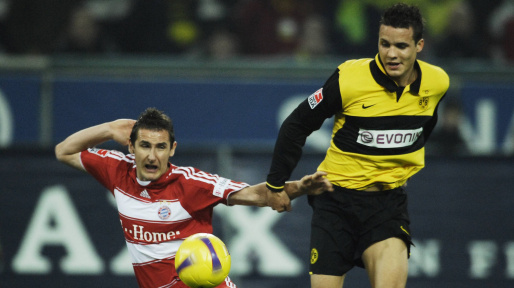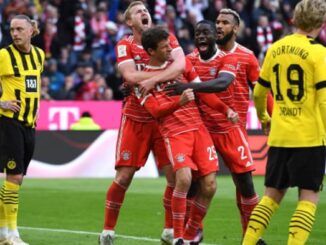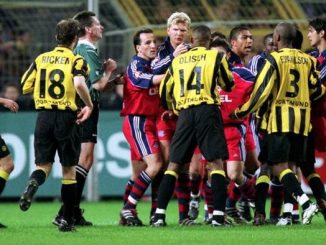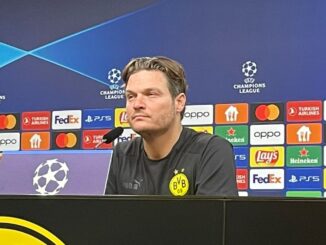
Philipp Degen, born 15 February 1983, is a retired Swiss professional footballer. Degen was usually a right back who could also play at left back or on the right wing. Degen reached the last 16 in the 2006 World Cup with Switzerland and was selected again for Euro 2008, but did not play any games.
Degen began his professional career at Swiss club FC Basel, playing four seasons in the first team before moving to Borussia Dortmund. He spent three years at the German club, his final season marred by injury. Degen signed for Liverpool on a free transfer on 3 July 2008, his stay at Liverpool was also blemished by injuries. His Liverpool contract was terminated by mutual consent on 31 August 2011 and he joined VfB Stuttgart on loan until the end of the season, playing in five matches. At the start of 2011/12, Degen returned to Basel. Degen ended his professional career at the end of season 2015/16 with a total of eight Swiss championship titles and two Swiss cup titles.
Degen has represented Switzerland at various age levels including Under-17s, Under-19s, Under-20s and Under-21s. Degen made his Swiss U-17s debut on 10 February in the 2–1 away win against the Turkish U-17s. His U-21s debut was on 20 August 2003 in the 1–1 home draw against the French national under-21 football team.
Degen played for the Swiss team in the 2006 FIFA World Cup, where they were knocked-out on penalties by Ukraine in the last 16. Despite having been injured for much of the season, Degen formed part of the Swiss squad for the UEFA Euro 2008 tournament. However, the host nation was knocked out in the group stage of the tournament, and Degen did not make any appearances. He played his final match for the Swiss national team in the 0-1 defeat against Norway on 14 November 2009.
Following active retirement, Phillip Degen started SBE Management, a Swiss-based player agency that represents players from across Europe, including Germany international centre-back Shkodran Mustafi and VFB Stuttgart goalkeeper Gregor Kobel.
Ben (BM): Philipp you played for both Liverpool and Borussia Dortmund. You were at Borussia between 2005 and 2008 and at Liverpool between 2008 and 2010, two massive clubs with a great history. Was tradition an important factor for you when deciding on a club to play for or just the ‘luck of the draw’ that you ended up at two clubs with so much history?
Degen (PD): Both Liverpool and Dortmund for me cry tradition. I always admired the supporters of these clubs. These are clubs with a lot of history, the big fan-bases, and then the stadiums Anfield and Westfalenstadion, amazing grounds; the combination of these factors is the reason why I chose to play at these clubs along with the opportunity to develop as a player under coaches like Roy Hodgson, Rafa Benitez, or Bert van Marwijk.
BM: Speaking briefly about coaches, let us contrast Jürgen Klopp with Benitez, who you worked with at Dortmund and Liverpool, respectively. There are different ways to describe Rafa. He was a very good tactician and has an incredible ability to read the game, but what was he like to get along with as a person? What was your experience with him? How does he compare to Jürgen Klopp?
PD: I think Rapha’s main strength, like you said, is his tactics. He was not the big talker; he was more like ‘Let’s get straight into the daily work’. He would focus on tactics, (which is) different to Jürgen, who is a communicator, a guy with fire. He has the power to keep getting everybody behind him. Rafa was a completely different kind of coach. Of course, Rafa was also successful at Liverpool, but when you have a boss, it doesn’t matter if it’s in football or business, if the boss has ‘fire’, the team feeds on that passion.
Klopp made things happen; that’s why success came back to Liverpool. He is a perfectionist, and you can see his work everywhere at Liverpool. Rafa was, of course, an excellent coach and also a very nice guy, but he was more analytical and less a people’s person. Rafa’s main strength was his ability to read the game.
BM: Another coach you worked under with the Swiss national team, was Ottmar Hitzfeld. He is a legend in the Bundesliga. What was it like working with Ottmar? The results he achieved like the Champions League win of 1997 certainly prove that he is one of the greatest coaches ever to gift Borussia Dortmund. What was he like to work under as a player?
PD: Ottmar Hitzfeld is similar to Roy Hodgson, who was my coach at Liverpool. Ottmar is a gentleman. He’s a guy the players look up to because he was very successful as a player, including with my home club FC Basel, and even more successful as a coach in the Bundesliga. Ottmar’s main strength, in my view, is his ability to earn respect; players always listen to him. Ottmar had great tactical ability, but it was his personality that led the team to success (with) old-school qualities.
‘Dortmund has a commanding presence with Hummels but I think BVB will do something at right-back’
BM: You played three seasons with Borussia Dortmund, so you know the club well. Let’s talk about the current season BVB are having. Dortmund has conceded 42 goals this season with 5 games to go, which shows there are defensive frailties that need addressing. As a former defender with Borussia, what are the defensive challenges Dortmund are facing in your view? Do you see issues in your preferred position at right-back? Which players do you see as being in the key defensive lineup for Dortmund currently? I guess you still follow Borussia Dortmund games a lot?
PD: Because our agency has youth players at BVB, who I cannot name as they are underage, I still know everybody at the club. I follow all the games. At the moment, the issue at BVB is the fullbacks, in my view. They brought in Thomas Meunier. I think this was to bring in some experience and stability, but I don’t think he has found his perfect position in the team as yet.
I think BVB will do something at the right-back position because also Łukasz Piszczek is getting old and will retire in the summer. Also, Nico Schulz is a concern. He has not made the left-back position his own. I think a new left-back could join in the summer? We will see what comes of the younger players (Mateu) Morey and (Dan-Axel) Zagadou; they have a lot of talent, but I need to see more of them. With Mats Hummels, however, Borussia has an experienced and commanding presence in defence who is invaluable to the club.
BM: After the departure of Lucien Favre in December, the club has struggled to play consistently. Although they reached the Champions League quarterfinal and the DFB Pokal semifinal, they have lost a lot of ground on Bayern Munich compared to the nine-point lead Borussia had over Bayern Munich in the 2018-19 season. Which other positions, apart from defence, do the club need to strengthen in order to start competing for the title with Bayern again?
PD: I think another area of concern is in defensive midfield. Can has added options, but a lot depends on Axel Witsel when he comes back and how. Although (Mahmoud) Dahoud and (Thomas) Delaney have been showing great performances, potentially BVB also can look for a further player for the defensive midfield. BVB have a very good team (with) lots of young talent, but the young players cannot play 50 games per season. Also, an area to potentially look at is in the striker position. There is a lot of reliance on one player. I mean, who can play upfront when Haaland is suspended or injured?
BM: You’re a football scout and talent manager yourself, what about Jude Bellingham? He has been instrumental in the success of the team this season at just seventeen. How good do you think he really is?
PD: I think getting Bellingham to sign is one of the biggest victories for Dortmund in years, because the challenge to get this player to Dortmund was very intense. BVB had to fight for months to sign him. Every big club in Europe wanted Jude Belllingham, but BVB signed Jude. It’s the right step for the player also, because Dortmund can develop the players to a much higher level than many other clubs, and that is very attractive for players at the stage Bellingham is right now. Think of Jadon Sancho or Gio Reyna and what they are becoming as players at BVB. Jude is turning out well because he has a great focus and is the kind of player who is grounded, and it shows in his performances, which are excellent.
BM: I noticed you didn’t mention (Youssoufa) Moukoko? You mentioned earlier that you think that Dortmund should have a backup for Erling Haaland. What do you think about Youssoufa? He is young, but how great do you think he could end up being as a striker?
“Of course every club wants to be part of the Champions League or win titles but a closed exhibition tournament like European Super League is not the answer, there is more at stake than money in football”
PD: Yes, I have seen Moukoko play a few times. Of course, he has a lot of talent. But I’m a little bit careful to predict things too early. Trust me, in football things are going very fast. Maybe by 22 Moukoko might not even be at the level he is at now. To put so much pressure on a player at 16, that’s not easy for young players; they are still teenagers. To manage that much pressure is very difficult, even at 20 for Haaland. You can make a big mistake in the development of a player if you don’t choose the right moment for them. You have to gradually introduce young players; that’s my opinion, but on balance, Dortmund has it right.
BM: What is it that made your time at Borussia Dortmund so special for you? You scored an amazing 3-2 in a 3-3 draw in 2006, and I believe it was your only goal for Borussia Dortmund, but what a goal! Do you remember that goal against FC Bayern?
PD: Yeah, it was against Oliver Kahn, who I know very well. He will be the new chairman at Bayern Munich when (Karl-Heinz) Rummenigge retires at the end of the season. He has done well. I can still see my goal at the Allianz Arena. In that era, the fullbacks did not play as offensively as now. So that was, of course, my strength; I could play offensively as well as in the back-line. I scored only one, but it was a good one to score I think?
BM: Thinking about the past year, the Corona pandemic has hit football pretty hard, and now we see an attempt to find a quick solution to the top club’s financial problems with this break-away European Super League idea. What do you think about the idea of this closed league for a small group of top clubs?
PD: I think money is a very important part of life, but money is not everything. We have as a football community been through a very tough time in the Corona(virus) pandemic, and it’s a very sad situation for football, especially for fans, because they cannot go to the stadium. We, as players, also cannot see the people on the terraces which we love. This is frustrating and soul-destroying.
I haven’t yet read all the details, but on the first view, I see clubs are also losing a lot of money. Obviously in the end, it’s a business. Of course, every club wants to be part of the Champions League, or win the league but in the end, does it matter if I earn 1 or 2 million more?
European Super League is not the answer, in my view. Such a breakaway league that takes the best clubs of Europe and plays them annually in a closed tournament does not make sense for the broader football pyramid of clubs down to amateur level. I can see the attraction of the money for the clubs taking part, but there is more at stake than money in the game of football.
The Revierderby is not just a game of football, it means more than that. Bundesliga will be different without Revierderby
BM: Lastly, I just want to ask you about another Swiss player at Borussia who has an English connection, as his parents are English. I guess you’ve probably keenly noticed Switzerland under-17 International Bradley Fink. Like Jamal Musiala at Bayern, Bradley is another talent that unfortunately slipped through Gareth Southgate’s net. Fink has chosen to play for Switzerland. What can you say about Fink? How good is he in your view?
PD: I like Bradley as a player. He’s very tall, he’s physically strong, he scores a lot of goals, and is a box-to-box player. He is very good in the area. However, he also needs to develop his technical ability, but I think he will. And he’s going in a good way in the U19s at BVB. You know they wouldn’t have signed him unless they had a vision for him at Dortmund. They have a very good scouting department, and I can see that Bradley could become part of the first team soon.
BM: Schalke were relegated on Tuesday night — after a 1-0 loss away to Arminia Bielefeld — for the first time in 30 years. This seems to be quite a loss to the league, but one which some die-hard Dortmund fans will have smiled about, even if only until the moment when the 2021-22 fixture list comes out and there are no Revierderbys in the schedule. You played twice in the derby against Schalke 04 in 05/06; why is the Revierderby still such a very special match? How does the Dortmund-Schalke pairing compare with other derbies you have played in, like Everton versus Liverpool. Is the Revierderby the greatest for you?
PD: For me, it’s one of them. I also played in the North-West derby between Liverpool and Manchester (United), of course, which is a huge rivalry, but Dortmund versus Schalke is not (just) football; it means much more than that. It’s unbelievable how the people in Dortmund are waiting for this game. The whole build-up until the game kicks off is amazing. The tension in the whole city is crazy. Schalke is a big rival, I could say it’s one of the biggest games I’ve ever been part of. Their sporting collapse this season has been terrific. For sure, the league will be different without Schalke, but there will be more Revierderbies to come.



